Beijing Trip
Flying from Thailand across China from far up, it looked like solid farms, with pratically no natural forest left, except over the occasional mountain range. How humans have transformed our planet!
Short History of Beijing and China
Beijing, located far inland, has been the official capital almost continuously for about 800 years, and one of the power centers before that as it was situated at the end of The Silk Road.
Genghis Khan and the Mongols invaded around the 1200s, and his successor, Kublai Khan, made Beijing the capital of Mongol China. Marco Polo visited and said "I believe there is no place in the world to which so many merchants come, and dearer things, and of greater value and more strange, come into this town from all sides than to any city in the world", and "So great a number of houses and of people, no man could tell the number". He alwo wrote "over a thousand carts loaded with silk" arrive in the city "almost each day" and then are readied for the journey to central Asia.
Kublai Khan reportedly created a palace of astonishing proportions, but nothing of it remains today. This destruction and disappearance becomes a repeat story in China ...
The Chinese Ming Dynasty defeated the Mongols in 1368, and restored Beijing in Chinese style. The city's new planned, symmetrical and organized layout created by the Ming Dynasty is pretty much the layout that still exists today.
The Ming Dynasty built the Great Wall to defend against the Mongols and Manchus (aka Manchurians), and it was successful for a long time, successfully defending against many major invasion attempts. The wall is an astonishing 6400 km (4000 miles) long. It is not the first wall, as building long walls to defend territory in China is recorded back to the 8th century BC, with many instances in-between. However, this wall is the biggest and most rugged.
Below is a photo I took after walking along the wall awhile. I started down at the lowest point you can see in the distance. This is north of Beijing a little over an hour.
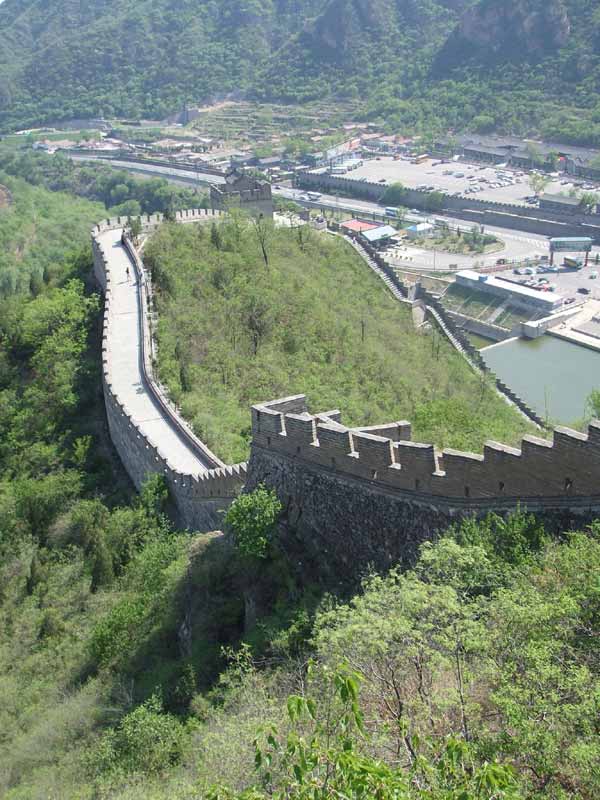
During the beginning of the Ming Dynasty, great ships were built and the Chinese sailed all the way around the horn of Africa and nearly to the Strait of Gibralter in the 1400s. These merchants not only displayed a new source of wealth from abroad, they also gained high social status and started to become very powerful. When a Ming emperor died and a power shift occurred, the established powers decided to eliminate this competing explorer class by outlawing ships of sufficient size to seafare, burning those which came back into port, and executing merchants.
If that had not happened, then the world would likely be speaking Chinese instead of English.
Within a few decades, the Portuguese were building similarly large ships, and thus began the European period of colonization, the end of the Dark Ages, and the rapid rise of Europe's wealth, power and influence in the world.
It makes me wonder whether this was just coincidence, or whether somehow it was cause and effect, e.g., some AWOL Chinese explorer in Africa who decided not to go back to China but instead to walk up the coastline with Muslim gypsies of the day telling tales and inspiring people ... since so little was recorded back then ...
The wall never failed, but one rebel general opened a gate and let the Manchus thru, who invaded in force and took over Beijing, thereby starting the next and longest dynasty of the past 1000 years, the Qing Dynasty. Why did this general do this?
The course of Chinese history was changed by one man's lust over a lowly female concubine, in a barking mad decision.
There was an ongoing internal political power struggle in China, as there usually is in societies, but it was between different Chinese. This general, Wu Sangui, was allied with a particular side (Li) which had gained the upper hand, until he found out that the leader (Li) had taken Wu's concubine in as his own. Enraged, he opened the gates and allied himself with the alien, foreign invaders, in order to overthrow Li with Wu's guidance!
(The concubine never amounted to anything more than a concubine.)
The warrior Manchus took the Chinese by surprise and quickly took over Beijing and surrounding areas.
(Very much at arm's length, Wu himself was allowed by the Manchus to run his little fiefdom on the periphery while they consolidated power over this alien culture with the Manchus' thinly worn army. In the power vacuum in the periphery, Wu built up his own army. Wu had considerable respect among his local yokels. However, once the Manchus consolidated their power, they went and wiped out Wu's army and his immediate successor (Wu had died by this time), not choosing them as an ally any longer.)
The subsequent Qing Dynasty ruled from 1644 to 1911. It's also known as the Manchu Dynasty. The Manchus are a small minority in China today, and originated several hundred years ago in what is now a region split between present day Russia and western China.
Perhaps by necessity, the Qing Dynasty became very organized and effective in governing in the early decades and centuries. However, after a couple of hundred years, corruption led to rot.
The Qing, all powerful at home, also remained in denial about outside powers and refused to engage in significant diplomatic relations or negotiate with the British and others. They thought they were the richest nation in the world and others were lessers. Given their status in authoritarian Chinese society, surrounded by yes men and super wealthy at the power center, it is understandable why. Old explorers noted that while European countries fought each other and had rival political factions within each country, China was united and peaceful. Of course, it was also repressed!
The Qing Dynasty is best known to many people for the "Forbidden City" where the emperor and royalty lived a fantasy life with a different female concubine each night, and all males not of royal descent who worked in the government halls of power were eunuchs, including some military generals.
The British eroded their power by importing Opium into China from India, which caused great social and economic devastation, and China's great trade surplus became a deep deficit. The Chinese banned opium and started to fight the British over the trade, but the British navy and army were far superior in technology. These Opium Wars in the mid-1800s brought British and French troops all the way to the walls of Beijing, but they were of insufficient numbers to control the massive capital, and I would bet the alien culture had a big part to do with it.
The remaining Chinese navy was easily obliterated by the Japanese at the end of the 1800s.
A concubine of a Qing emperor staged a coup and ruled for a corrupt 47 years, squandering wealth on ostentatious palaces rather than much needed military upgrades, infrastructure and modernization, often moving funds already earmarked for these other things back to ostentatious self-indulgence. She was just totally careless and oblivious to China's needs. Some natural disasters contributed to the pressures for change. It took a lot of suffering before change came, but after half a century of her rule, resistance armies grew until, in 1911, the Qing Dynaasty was overthrown. However, by then, many different factional armies had developed and been running their regions on their own, so that the official fall was by then a footnote in the fracturing of "China".
Beijing came under the military dictatorship of Chiang Kaishek until the Japanese came in 1939, and again after the Japanese were defeated by the US in 1945. Other regions were run by different factions. Chaing Kaishek's army resumed control of Beijing, with the assistance of American Marines.
One of those factional provincial armies was Mao Zedong, the son of a fairly prosperous peasant family, who slowly built up an army over many years. In 1949, Mao's army defeated the final resistance in Beijing, Chaing Kaishek's army. Mao's army then quickly overran all remaining resistance in China, and reestablished Beijing as the capital for all of China.
Mao was a Marxist idealist of great oratory skill and charisma.
Mao promoted another great communist experiment of the 20th century: Communist China. Like other communist and socialist experiments, however, it of course failed, due to human nature, the suppression of freedom of speech and creativity, and its attendant checks and balances system. Instead, centralized power blocs formed, corruption set in, creativity was suppressed, and you know the kind of story from there...
The 1950s saw Mao's Great Leap Forward, with the destruction of most of the past, including landmarks, in order to create an entirely new future. This was followed by the Cultural Revolution starting in 1966. This included the Red Guards who were ordered to destroy the Four Olds: old ideas, old culture, old customs, and old habits.
Few ancient buildings survived destruction.
There was a lot of starvation in China due to collectivization, but it's important to understand that there was a similar amount of starvation over the previous hundred years or so. Nonetheless, centralized management and repression of constructive criticism led to a lot of dysfunctional economic planning and implementation.
In 1976, a few months after an earthquake in a part of China that killed half a million people, Mao died.
It took just a couple of years before the new leaders were openly criticizing Mao and the ubiquitous statues and portraits of Mao started coming down.
However, protests against the established Communist Party were not tolerated, with the massive 1989 Tianamen Square crackdown putting an end to public dissent.
Mao's face still appears on the front of every bank note of value 1 Yuan (10 cents or 5 baht) or more. Actually, there's only one banknote without Mao's face, a very small value one.
Nonetheless, the move to capitalism and massive Westernization is quite overwhelming. It seems that the Communist Party controls only the media, taxation, and government services, which are a very small part of the Chinese economy and society.
Coming to Beijing, you'd never guess this is a Communist country. Beijing is far inland, and it's even more capitalist in the coastal cities.
As an example of China's modernity, Beijing almost won the hosting of the Olympics in 2000, and did win the hosting in 2008, the first time the Olympics has been hosted in a developing country.
It's said that this is the best thing that's happened to Beijing in ages. Long overdue infrastructure upgrades have been implemented, parks and roads have been prettied up with trees and vegetation, polluted canals cleaned up, and so on. However, this facelift could potentially be overkill and create another big domino effect like the 1997 Asia Economic Crash.
I don't believe a lot of what I read, so I went to see and think by myself.
My trip to China was long overdue. I had originally planned to travel to a coastal city, Xiamen, one of the first "special administrative regions" (SARs, a double-meaning acronym now), but at the last minute I diverted to Beijing. Hong Kong and the mainland Chinese cities over the border were ruled out due to their expense, but Beijing proved to be not so economical, either. However, I wanted to see Beijing soon before the Olympics. I also have business ideas about how to profit from the Olympics which I like to entertain ... in case anyone's interested as a strategic partner ...
A streetsign:
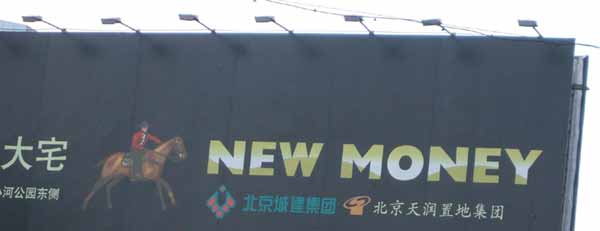
First Observations
Arriving at the airport, everything feels organized and properly friendly, starting with the immigration official who returned my smile, on to the taxi (metered, small and modern).
The real shock is how modern Beijing is. Skyscrapers everywhere, though it appears that a quarter of them are under construction, with cranes everywhere.
Beijing is also not crowded. The taxi breezed to my destination near the city center 30 minutes away. 8-lane roads are common. Though an ancient city, it was extensively demolished and recreated during the Communist area (yes, not much preserved), and is well planned. The sidewalks are very wide (unlike Bangkok) and thus not crowded at all. In the city center, you don't at all get the feel you're in a densely populated, developing country.
With the 2008 Olympics in Beijing right around the corner, I've been reading about how the government has been fixing up Beijing to be most presentable and impressive to the world, by cleaning the city, planting a lot of trees, and fixing up parks. A modern train link from the airport was under construction (like Bangkok).
Nearly all major streets had moderate traffic and a frontage road. Sidewalks and roads were spacious.
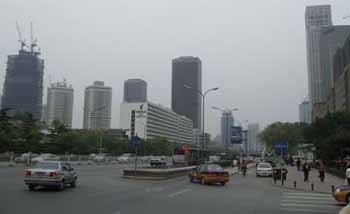
Trees and vegetation were commonly planted along streets
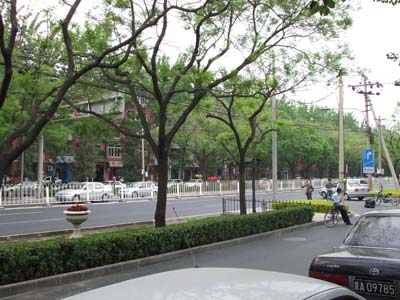
Hotels are not cheap like in Bangkok. After a lot of hunting, I found a good budget hotel in Beijing with free internet for US $ 28 per night, called Sabrina Apartments. The website was in good English.
Overall, I was happy with the "hotel" room, especially the location, as it was in a back road near a set of modern shopping malls, near the city center but not amongst the skyscrapers, and not heavy traffic. The rooms did not look nearly as good as the photos on the website (no surprise), and it had a few anomalies like no closet (!!) and no silverware or plates in the kitchen, but it was clean, very secure, new, quiet, and otherwise fairly complete. The desktop computer in the room didn't work at all except the front lights coming on, and I suspect maybe some earlier tenant stole the memory, CPU and hard disk (no sound of disk or CPU fan, just power supply fan), no signal on the screen. (I brought my portable.) The internet broadband (cable modem) was fairly fast. No bottled water, no eating utensils -- no plates, fork, spoon, or knife, and not even a chopstick! Just empty shelves above the sink and counter. There was a hot water heater and a couple of tea cups, but no tea bags. (I always carry Lipton tea with me.) One small roll of toilet paper with a hard rubberish texture that most resembled gauze. I put it in some water to test it, and it did desolve quickly.
A Chinese lady nicknamed Sabrina had bought 33 rooms in a large, fairly new apartment building and was privately renting them out on a daily basis. She was the only person there who spoke English. Whenever any foreign person walks in the office, they pick up the mobile phone and call her.
A retired California couple had also found Sabrina on the internet, and they were funny to watch. They often disagreed with each other in a scoffing way, but each seemed right half the time. I commented "two heads are better than one", and they laughed. I almost said "opposites attract" but they were too old for that.
The first night out, I just walked around. It was nice to be in a cool place, way outside the tropics, unlike Bangkok.
However, also unlike Bangkok, there was precious little English. It was like you're completely illiterate and deaf. It made me appreciate Thailand!
The Chinese in Beijing are more relaxed and pleasant than the Chinese overseas on average. Beijing is a good place for people watching, especially couples. Very nice. People seem fairly relaxed, not too serious, and the pace is reasonable.
The ladies are lovely, and many are tall. (I like tall ladies.) The men are gentlemen. Surprisingly open displays of affection are not uncommon, including kissing in public, between Chinese, which is quite in contrast to Thailand and most other Asian countries. However, it's not as gaudy as I sometimes see among Western vacationers.
Ladies most everywhere seem to be more conscious of fashion than men, and Chinese ladies seem moreso than in most countries. However, sexy dressing is uncommon. There are no very short skirts, unlike Thailand.
People just seem to be in pursuit of happiness.
The shopping malls were surprisingly chock full of Western brand names, with seemingly precious few Chinese brand name things. The concept of "branding" their own products seems new to China, but they sure love Western name brands, because that's practically all there is on products -- Western character names, and the main Western brand names dominate overwhelmingly.
They had food courts on the top floor like in Thailand, and so I just got some Chinese fast food, which was good. Not spicy at all, all kinds of meats with teriyaki-like sauce over the top, and lots of vegetables, over rice. Also like in Thailand, the grocery store is always in the underground floor. There, I stocked up on bottled water, alternative toilet paper, rolled oats, milk, lemon for my tea, bread, apples, etc. Then I rested up for the next day.
Beijing is EXPENSIVE compared to Thailand, with few exceptions. For example, I thought I would buy some Made In China tennis shoes. At the shopping malls, there was nothing less than $60 (2000 baht), and most were in the $100+ range. It was mostly Western name brands, but even the no-names were expensive, and not well designed. I decided to stick with my hard shoes and just get thick socks, which I found down an alley. A mom and pop shop had its cheapest unstylish pair for $20 (700 baht) and very basic strap-on sandals for $12 (400 baht) which were far inferior to what I buy in Bangkok at a lower price. The next cheapest shoes cost 50% more, and others cost far more.
The Yuan, aka the RMB, is a pegged currency (i.e., not floating freely on the market), so maybe it's overvalued.
In the grocery store, it seemed like most things were about 50% more expensive than in Thailand. The only thing similar was the price of a bottle of water.
Western fast food is the rave. McDonalds and KFC (Kentucky Fried Chicken) are always packed, and also within a few hundred meters of my apartment were Starbucks and Pizza Hut. Fortunately, Chinese fast food places were among the Western ones, they were not crowded at all (in contrast to the Western fast food joints), and the food was far better. Instead of waiting in a long line to order or find a table at a Western fast food joint, I could walk right up to the counter and place my order at the Chinese fast food places, there were more empty tables than occupied ones, and the food was quite good -- freshly cooked broccoli, cauliflower, and carrots with a light sauce over rice, and some sort of teriyaki-like sauce over the chicken, pork, beef, or fish. I was afraid of eating the fish because I wasn't sure if it was from the ocean. River fish are commonly eaten despite the pollution in rivers.
Western music is everywhere. The only time I heard Chinese music was in one taxi.
It seems like the Communist Party created a huge cultural vacuum for the imperialists to step into. Never mind the Chinese military or Washington, as China is colonized by Western marketing agencies, even if it's just the fringes of the force fields they emit thru the mass media. The Chinese just gobble it up like they haven't eaten much for decades. It's sad that they have little original creativity to contribute to evolutionary progress. It's both shocking and boring at the same time.
The Chinese Language
Before I go any further, I must say that the biggest barrier to China is the written Chinese language. There is very little English in China (just like there is little English in Japan), which makes Thailand look English rich! The vast majority of Chinese products do not have dual language (local and English). Street signs in the city center are dual language, but that might be because of Olympics preparations. The buses and subway lack English, for example.
There is nothing phonetic about the language, unlike Indo-European languages and Thai. (I can read Thai and Russian.) The Chinese characters are abstract drawings of the concepts they depict.
A romanized version of Chinese was invented and standardized in the 1950s, called Pinyin, but that project couldn't take hold and was abandoned.
Vietnam romanized its language successfully, and the English there is significantly better than in China. (I was in Vietnam about 6 months before my China trip.) I have noticed that countries which romanize their language, such as Malaysia, Philippines, and Vietnam, have citizenry which move between their native languages and English much better.
The earliest recorded Chinese goes back about 3000 years, but it is clear from those inscriptions which survived time (carved into bones) that the written language existed long before then because it's already advanced in those ancient carvings.
Notably, there are vastly different dialects in China which use the same written language but entirely different pronounced words. Again, there is nothing phonetic in the written Chinese characters.
The language itself has a very similar nature to Thai and is simple -- no conjugation of verbs, no variation in word endings, just add a word for future and past, and so on. Like Thai, Vietnamese, and some other Asian languages, it's a tonal language, which takes a little bit of getting used to. It seems that speaking Chinese and learning the pinyin system wouldn't be too difficult, but forget being able to read signs, maps, products, etc. (though I did learn which symbol meant more expensive taxi!).
Getting Around
Taxis are modern, metered, and cheap, about the same as Bangkok, costing 10 Yuan = 50 baht = $ 1.50 to start, but the fare goes up very slowly from there. Most rides of several kilometers were only about 15 Yuan. The Chinese taxi drivers don't understand verbal or written English, despite the government's push. You must point to a map with Chinese language on it, or have other pictoral or written documentation in Chinese.
Forget the buses, in my opinion. Too difficult to figure out. The bookstores didn't have any decent English language maps with bus routes.
Many foreigners rented bicycles, and I think that's the best thing.
The subway is PACKED.
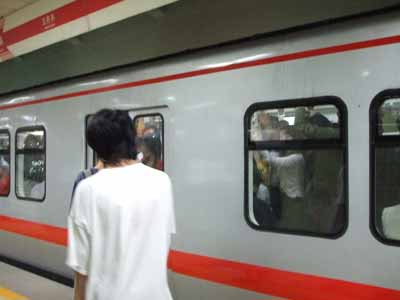
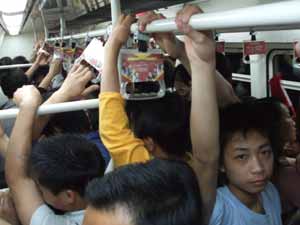
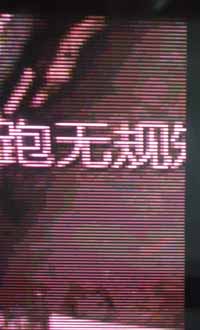 When the subway goes thru the tunnel, movies of advertisements flash up on the wall of the tunnel next to the windows, from a projector attached to the train. I tried to capture these with my camera but it didn't work well. To the left is just a little bit that did show up on my camera. It was a mismatch of camera and projector speeds. I expect this to come to the Bangkok subway someday.
When the subway goes thru the tunnel, movies of advertisements flash up on the wall of the tunnel next to the windows, from a projector attached to the train. I tried to capture these with my camera but it didn't work well. To the left is just a little bit that did show up on my camera. It was a mismatch of camera and projector speeds. I expect this to come to the Bangkok subway someday.
Paying for the subway is not automated at all, i.e., the subway does NOT take tokens or cards and there is no gate. You buy paper tickets at a booth, and then employees stand there at the entrance to each station and takes the tickets!
I suggest you stick to taxis.
I walked a lot, probably about 30 kilometers or more.
Most modern buildings in Beijing are fairly ordinary and conformist by modern standards, and do not show the architectural flair common in Bangkok and elsewhere in the world. However, there are some exceptions:
This building is under construction:
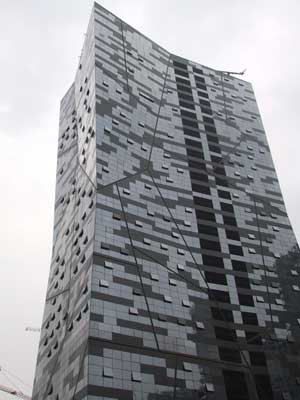
On the same street are a whole lot of highrises under construction:
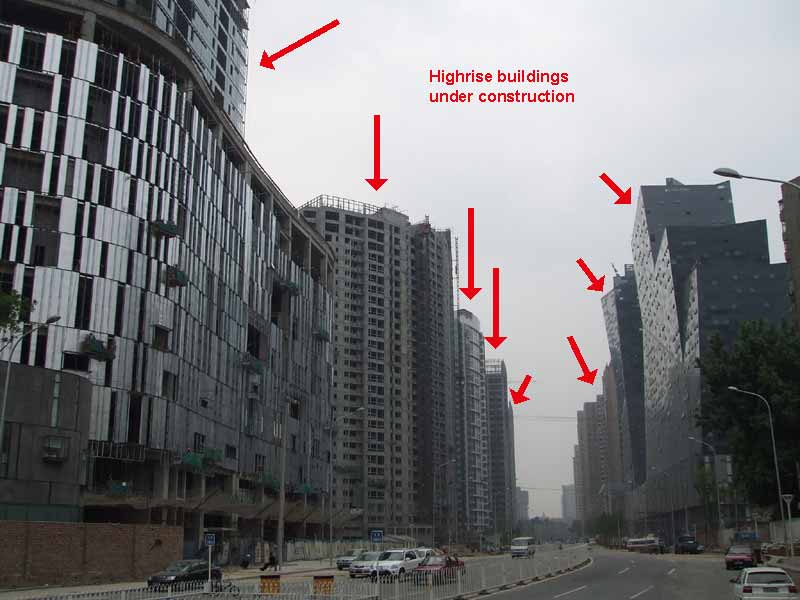
Not only that, but there were more buildings under construction right behind the street facade on the left of the photo above (see the first two arrows in the photo above -- the photo below is right behind those buildings)!! :
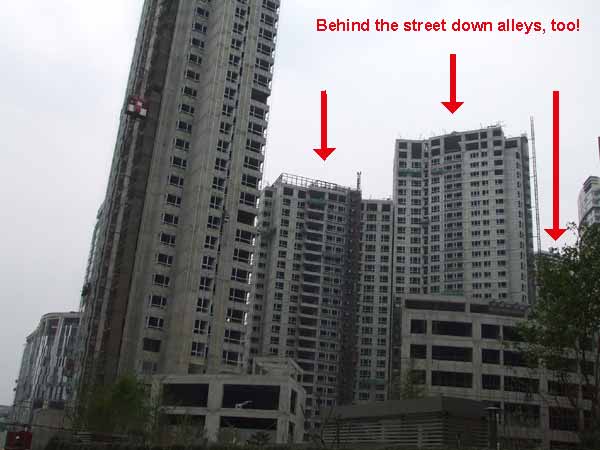
If you go down the street at arrows 4 and 5 of the top photo, you'll see this:
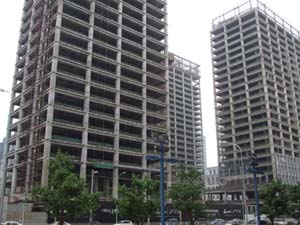
I suspect these are the seeds of another economic crash similar to the one in 1997 which began in Bangkok, due to overbuilding of highrises. I suggest you read my article on that. I was directly affected and saw this unfold from 1995 to 1997. See my article there on the 1997 Asia Economic Crash.
All of the above is in what is seen as the new trendy place in town. However, you can go to another trendy place in town (by Chaoyang Park) just a few kilometers away and see this skyscraper which looks like it's been sitting there collecting dust for a long time already, and has some other highrises in the area which are also partly or wholly empty. The building in both the center and on the rightside are the same complex, both empty. In the foreground is a marker associated with the building which has either fallen apart from poor materials and workmanship.
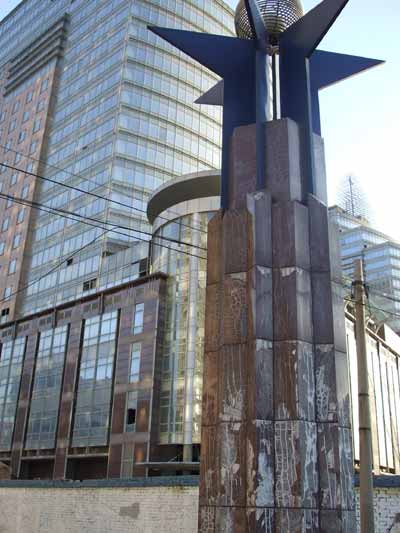
This was one time in which some security guards in the area indicated they weren't pleased with me taking photos by starting to walk towards me, but they were too far away and I went around a corner and then took off. That abandoned building was right across the street from this:
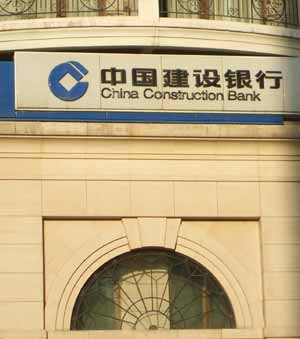
I stopped taking building photos after that.
Right down the street was this entertainment venue which was blasting American black rap music with foul lyrics. I took this photo before walking in. I went to take a look but the guard stopped me and told me only Chinese people were allowed inside:
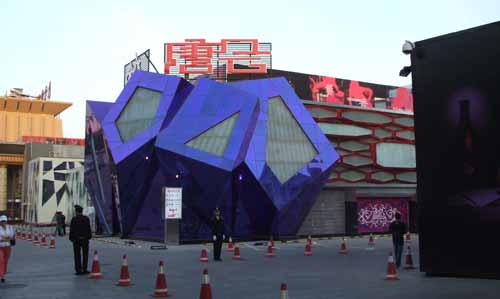
Speaking of guards, they sometimes stand on top of a box under an umbrella, like this one in front of an embassy:
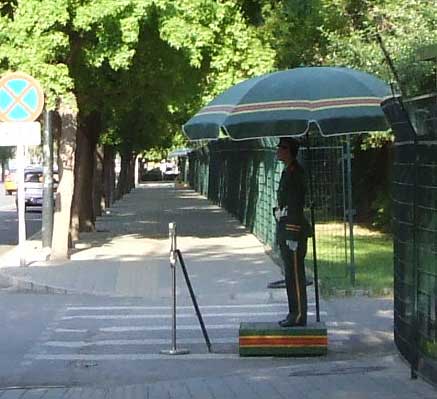
One of the embassies, for some small European former communist country (I forgot which, maybe Albania?), had what looked like a modern armored personnel carrier in a driveway and three guys standing posed in a V-shaped ready-for-action formation, the one on the back with an automatic rifle. It all had the feel of some kid's plastic soldier set, or maybe it's today's terra cotta warriors. I've never heard of an embassy in Beijing ever being attacked, especially a relative nobody country like that, but they were ready for an urban assault upon their embassy grounds. It's all gotta be for some sort of fantasy status and show, for some spoiled ambassador's ego massage every day. Imagine that being your job every day, just standing there like a doll for a ridiculous reason. Maybe they just don't think.
However, I wasn't going to take a photo of that, as there was a watchful eye, and with such a boring environment, I didn't want to become the point of interest for an exercise! Especially since my camera was chock full of my tourist photos for the past two days and I didn't want to take any chance of losing them.
Within just a few hundred meters is the entrance of Ritan Park, which is right smack in the middle of the embassy area. Oddly, right at the gate of Ritan Park is a nightclub called Maggies, one of the seediest places in Beijing. The guards probably see the traffic going in and out of there, as well as hear people talking as they walk down the sidewalk, and must wonder what the real world is coming to. More on Maggie's later.
At night, I followed the guidance of my tour book and went to the tourist and expat social area, called Sanlitun, which is a couple of kilometers north of the main embassy area. What a disappointment. It was lined with restaurants and bars, but the touts were very annoying, verbally pushing you to go inside their place, seemingly for every venue down the block. I got there a little early (and presumably it's more popular later), and a photo of part of the strip is below. As a single male walking down the street, when I didn't go inside and waved them away, the last thing offered was a lady, oftentimes. I'm reminded that I'm still in Asia. There were also touts offering ladies for 100 Yuan = 500 baht = $15 for a short taxi ride away (and if you believe any of that, you're foolish). However, I followed some other tourists across the street and down an alley to the side street mentioned, which didn't have the touts, but also didn't have many people. Maybe it was too early. Bangkok's nightlife starts to late for me, 10pm to 11pm when I'm home preparing to go to sleep and work the next day. I have to wonder what these people do for a living.
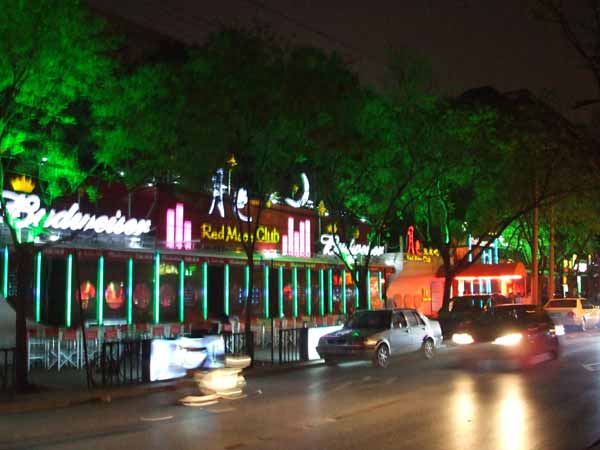
The Sanlitun night strip is just a few years old, and according to my guide book, its success is believed by Chinese to be due to the Chinese superstition of architectural orientation called "Feng Shui". As a real estate agent in Bangkok, I'm all too aware of some Thais of Chinese immigrant heritage who assess the "Feng Shui" of homes and offices available for sale or rent. Feng Shui is an elaborate art regarding north-south-east-west orientation (similar to astrology, the flow of different spiritual and energy traits, and so on), so that if the Feng Shui isn't right, then you can't sell it to these people.
There are a lot of jokes about Feng Shui, which foreigners laugh about but Chinese take seriously. Like if your door is oriented in one direction and your window in the other, then you will never get rich because the money coming in the door will blow out the window. Anyway, in this case of Sanlitun, a prospective buyer of the unsuccessful nightclub saw the problem right away: The toilet door was facing the entrance door, and therefore all the money was flushing down the drain. He changed that and then the place became a wildly popular place. Of course, I'm sure he changed a lot of other things as well...
Then, true to Chinese form, countless copycats sprang up down the street, and now none of them have enough customers to cover their rents, apparently. This happens all the time in China (and Thailand) -- one place makes a lot of money, then a zillion copycats surround it, then they all lose money. What does Feng Shui have to say about that?
Maybe they are so desperate as to make their money selling women now, because nowhere else in Beijing did I ever get offered women like that.
It also appeared to me that there were likely a lot of drugs in that area from just by people watching, including some discreet sellers on the street. I wasn't the only people watcher. However, an experienced dealer would know I'm definitely not a drugs user.
I sat at a few good vantage points to people watch. The restaurants and bars are not like the tourist parts of Bangkok where you can easily mix with other foreigners (especially the British and Australian pubs in Bangkok). The other foreigners seemed to be in groups, some of them cliques. They also tended to be very young, predominantly in their 20s, like young rich kids, not professionals, quite unlike Bangkok.
Eventually, I spotted what was clearly a group of newcomer tourists like myself. They turned out to be a friendly group of American guys who had been in Beijing just a few days. They had followed another guide recommending some American pubs for mixing and some other places, but had found they were either lightly populated or closed, and Sanlitun was still the main place, except a row of discos they had been to and shared, which were happening places and sounded like good people watching spots. There was a group of friendly American ladies, too. I picked up a few conversations, mostly American. Beijing seemed to be the opposite of Bangkok -- lots of Americans, and precious few Australians and Brits.
I decided to leave Sanlitun and go to the Chinese disco and people watch. I'd noted on the map where my American acquaintances said was truly a happening place, and pointed to that in a taxi. As usual, it took the taxi a little while to analyze the map, but it turned out to be only about 10 minutes away.
There was no other nightlife along the way, but suddenly there was a row of discos separated only by a wall, and surrounded by no other nightlife. Like at Sanlitun, it looked like the copycat mentality had already hit. It totalled about 5 big flashy discotheques side by side. I went into one which was particularly well attended by apparently wealthy Chinese, and there were luxury and sports cars driving by and parking.
I sat at a corner of the bar near the door to scope out the place and people watch. I smiled at a waiter passing by, and he came to serve me in a friendly way. When I chose my beer, he asked for the money in advance ... which I guessed might be customary there ... as he wrote down the cost on a piece of paper right there and lit his lighter to show it, and without any ado or hesitation I handed the cash right over, but after that he went out of his way to point to his number and then make clear he would really be back with my beer. I should have taken that as a clue. More on this later. Maybe he knew I was new. It seemed like he was communicating to me to be careful, in a friendly manner. He gave me a warm smile when he returned with the beer.
In people watching, I had noticed, among many others, a lady who was hanging out with the waiters and talking with a manager, but not wearing a uniform and she wandered around a bit. I thought maybe she was PR or something, as can be seen in some Bangkok bars. I didn't notice her again until half an hour later ...
I had migrated around and eventually went and danced on the floor alone. The Chinese are nice dancers, not like "robots" as I had heard before from people who had visited China's nightlife. There was a variety of dance styles and it was nice and loose.
There is a lot of uniformity of male hair cuts, both Asian and western expat, across Asia.
All western music.
After I finished my beer, I decided to dance awhile on the dance floor and try Chinese style. After I was on the dance floor awhile, that PR lady came up and danced with me and was very nice, and spoke awhile in English. Eventually, I went back to the table and she asked me to buy her a drink. I said hmmm..., OK, two beers at 30 RMB each, and gave her a 100 RMB note (expecting change for the next taxi ride). She never returned. Later, I saw her dance with another guy. I eventually caught her back at the bar in the other zone next to the manager and waiters, and asked her about the drinks or my 100 RMB, and she just ignored me and walked away.
Of course, nobody who worked in the bar (besides her) spoke any English, so I went to the quiet lobby in front where they have usher staff who speak no English, and they brought in an ostentatiously dressed short Chinese guy who spoke good English. I explained what happened, and exactly who the lady is and her association with the waiters and manager. He said nothing, and then when I was finished, he said it was my fault for giving money to any lady, and categorically he doesn't know that lady, clearly with an attitude to tell me he has the power to tell me to f**k off. It was fairly clear to me that the place has a dodgy underground and he did not want to be the policeman of any scams of his employees. Of course, I wasn't going to make any big deal out of just $15. The name of the club is the Angel Club -- don't go there!
I had come alone as the obviously new guy in town to scam, and I don't think anyone there thinks about tomorrow or their reputation, and probably take pride in their ability to screw others.
The whole incident really made me realize that I'm in China, not Thailand, and while the people look fairly similar and behave in a mellow way unlike what I expected in China, it is in ways like that that it's the opposite of Thailand's confrontation-averse keep-things-pleasant ways.
Also, it's the city center, and I would bet things are better in the suburbs. However, with the difficulties for a foreigner getting around in the city center with the Chinese language barrier, the suburbs were not much of an option for a newcomer like me.
I went back to a region near the embassies where I had previously seen some Russian signs and places around Ritan Park, like it was the Russian part of town. I studied the Russian language and culture more than 20 years ago, and I still have an interest in travelling to Russia in the summertime. There was a dinner disco place full of Russians. All the music was Russian, and all the conversations were Russian. It was nice hanging out and just listening and watching. This was the highlight of the evening. I didn't open my mouth or socialize at all. Just drank a beer in a discreet place and did people watching and listening. The guys were mostly relaxed, but there were a few toughs there.
When I exited shortly after midnight, I was surprised to find that some other nightlife places within view had closed already. I was on the western side of Ritan Park, and I'd already walked the north end, so I continued counterclockwise past the south end which would walk me past the embassies I'd been to before and on to the tourist strip near the American embassy.
It was a nice cool night under a full moon, the security in front of the embassies is reassuring, it's not bright there, and Beijing has a safe feel to it, so I went for a peaceful walk.
However, right at the southern gate of Ritan park was another nightclub with foreigners standing around outside of it, called Maggies. These were generally guys between 30 and 60 years old, and people were walking in and out of Maggies. It was a little bizarre because it was part of Ritan Park in a way. Ritan Park is a city block with a fence around it, and a centuries old park. Maggies had its entrance right at the gate, in neon letters above an archway. I had been to Ritan Park before and didn't notice it, and Ritan Park closes around sunset. It just seemed surreal that a nightclub could open at the gate of a historical place like Ritan Park.
Walking inside, it turned out to have a large bar, two sizeable lounges at both ends, and a pool table. It was a relaxed place to mix with other expats, but also had a lot of ladies there, somewhat like Bangkok's Thermae. I spoke with a few guys, and had a particularly good conversation with a German guy who was an experienced expat in Beijing, mainly because he was interested in learning about Bangkok. Among other things, he explained about the ladies there in Maggies. Many of them are from Mongolia, but most are Chinese. They usually go for 800 to 2000 RMB, with most around 1000 RMB. 1000 RMB = US $ 150 = 5000 baht! (This compares to 100 - 300 RMB in Bangkok = $15 - $45 = 500 - 1500 baht. Actually, I don't know the going rate in Bangkok, but that's what it was 10 years ago, and even cheaper in the seaside city of Pattaya.) Shorttime hotels are not customary in Beijing, unlike Bangkok, and most guys take these money-grubbing strangers back into their hotel room or home!
I spoke with one of the Mongolian women, who was quite attractive and sharp. She had taken the train from Ulaan Bataar to Beijing. Her English was quite good. It turns out she has a university degree in economics. However, that conversation ended when she stater her price of 1000 RMB and didn't want to waste her business time if I wasn't interested, though she made that clear enough in a polite and pleasant manner. She had asked me about my past and what I was doing in Beijing, and appreciated my business story in Asia. I think she wanted to do some kind of legitimate business, unlike most prostitutes who just lazily make money on their backs. And sure enough, right after I left her, another lady there from Kazakhstan came up and introduced herself. Good English, and good Russian, but she asked if I wanted to take her very quickly, and when I said that I'm not here to find a lady but just to socialize and watch people, she cut the conversation short. However, she quickly took out a stack of post-its from her pocket and gave me one. All had just her name and phone number already prepared on it.
I exited and took my stroll past the toy guards and then took a taxi to the apartment and quickly fell asleep.
Notably, even very late at night with empty streets, the taxis still wait at red lights. In Thailand, if it's late and nobody is around, cars will run a red light after stopping to look around. In China, I never saw this. I also didn't see much jaywalking, unlike Thailand. People generally follow the rules in Beijing without questioning.
The next days were pretty much uneventful. I walked thru Tianamen Square, past Mao Zedong's mausoleum where his pickled body is displayed, mainly to a queue of people from the outer provinces. It's said that the formaldehyde preservation of Mao's body didn't go well. They brought in the Vietnamese who had done such a good job with Ho Chi Minh's body, but Mao's swelled up horribly and incurred damage, an ear fell off and had to be sewn back on, and so on, according to my guide book. As you can't get too close, it's also been said that the body displayed might be wax, not really Mao. Who knows?
Walking some of the streets and parks of Beijing is quite pleasant, but it does get old.
The Ming Dynasty had a 40 km wall around Beijing. Now, only one 1.5 km stretch still exists, which was only about a 10 minute walk from my hotel.
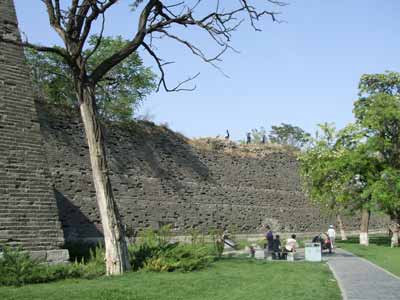
For most of my remaining time, I sat in my hotel room working by internet, minimizing my money spent, and waiting for my plane flight back. My flight in was on an airplane that was about one-third empty. I flew Egypt Air. I tried to move my return flight to an earlier date, and the "call center" email support said the flight wasn't full, but then they ignored my emails for the next 3 days, finally apologizing on the last day by explaining that they had a long queue of email which took them 3 days to answer to. My staff had also called the Bangkok office, but they said all flights were full. However, when I eventually did get on my plane, it was only half full at most. So many people slept on the flight, stretched out in the middle section.
Anyway, back to my time in Beijing...
The $100 Taxi Ride to the Great Wall and Back
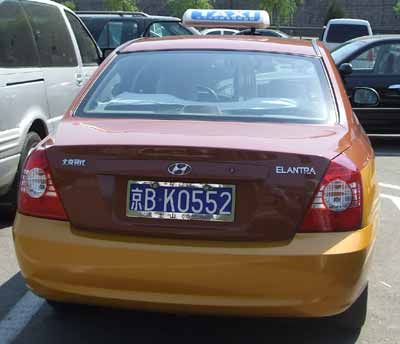
I saved the trip to the Great Wall for the last day, as my flight left at 8pm but I had to check out of my hotel at noon. The Great Wall is just a little more than an hour from Beijing, and round trip can be bargained in a taxi for less than $100, but I took a more comfortable taxi and made it a $100 taxi ride (just like the old National Geographic show "$100 Taxi Ride"). The driver was a middle aged Chinese lady robot.
Beijing is flat, but shortly before the wall a rocky mountain range springs up. The Ming Dynasty chose to build the wall on top of the mountains, not along the plane below. I would guess it's for two reasons. First, the mountain tops give a better view of anyone coming. Secondly, there are lots of rocks up there for making bricks for building the wall.
I must say, it's pretty awesome. A picture is worth a thousand words. It is STEEP and darn good exercise climbing on the stairway on top of the wall going up the mountain. There were two ways you could go, to the left of the highway or to the right. The crowd of Chinese was going to the left, with the wall stairway packed side to side. I went to the more rustic side as did most foreigners, which was sparsely visited. What a contrast. I can't imagine anything about the leftside being so much better that it justifies going with the pack, but maybe that's their conformist pack mentality. I looked at the landscape but just couldn't figure out why they all go there. Maybe there's a good luck ghost over there?
The climb up the wall is steep in some places, and some of the steps are high. Here's an old lady from the UK making the climb. Note also the younger lady further up putting her hand on the next step.
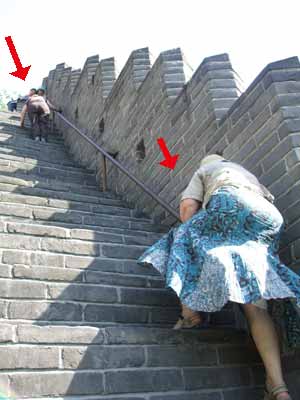
I initially climbed up very quickly, but had to stop and catch my breath, at which time I realized the view and how high I had already climbed! The air is very dry and caused a little bit of pain at the top of my lungs.
Going thru the periodic guard stations, it's easy to imagine being a soldier many hundreds of years ago with those guard viewpoints and sleeping quarters and conditions.
On the way out, I got a set of postcards (always better than my own photos), Great Wall shirts for my two daughters and one for myself, going for $3 to $4 each.
Then taxied to the airport.
The airport is basic and mundane.
The flight next to mine went to Harare, Zimbabwe. Is China one of the last allies of Robert Mugabe?
At the gate waiting to board the plane, the Chinese guy next to me kept spitting on the floor. This is something I find really irritating about a lot of Chinese -- they spit a lot. It's like a robotic maintenance gesture of being old style Chinese and belonging to the group. Spitting goes along with a habit of cultivating spewtum. It's like if you blow your nose constantly, then you can make irritate your nose and make it run continuously. They also don't take off their shoes at the door of the house. (In Thailand, you NEVER wear your outdoor shoes inside the house. You either change to house shoes at the door, or walk barefoot.) I did not want to put my backpack on the floor of that airport!
With just 14 Yuan left in my pocket ($2 or 70 baht), I had avoided a last minute currency exchange or ATM withdrawal. That was a pretty fine achievement. I felt I'd gotten my money's worth from this trip, having stayed within budget.
The plane actually left about 20 minutes early! It was at most half full. They had filled the seats on the window sides of the aisle, leaving nearly all the center section empty. This allowed people who wanted to sleep to go stretch out in the center.
The Chinese guy next to me spit on the floor of the airplane!
I moved to the center and slept a couple of hours.
It felt so good to arrive in Bangkok. I was really happy, and the immigration officer sensed this and gave me a warm smile. I could also communicate effortless once again, in Thai and English. Home sweet home.
Please pardon my poor grammar in parts of this article. I skimmed it on my website and cringed at some of the mistakes I saw. When you don't speak to foreigners for a long time, and speak mostly to Thais and other non-native speakers of English, you often speak to be best understood instead of speaking correctly, which sometimes mean
If you choose to submit feedback, then I wish to thank you in advance.
After you click on Submit, the page will jump to the top.
|

